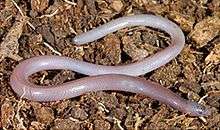Dibamidae
| Dibamids | |
|---|---|
 | |
| Anelytropsis | |
| Scientific classification | |
| Kingdom: | Animalia |
| Phylum: | Chordata |
| Class: | Reptilia |
| Order: | Squamata |
| Family: | Dibamidae |
| Genera | |
Dibamidae is a family of legless lizards found in tropical forests. Relatively little is known about the dibamid lizards, which are native to Mexico, Southeast Asia, Indonesia, the Philippine Islands, and western New Guinea.
They are small insectivorous lizards, with long, slender bodies, adapted for burrowing into the soil. They have a rigidly fused skull, no pterygoid teeth, and no external ears. Their eyes are greatly reduced, and covered by a scale. While female dibamids are entirely limbless, the males retain small, flap-like hind limbs, which they use to grip their partner during mating. They lay eggs with hard, calcified shells, rather than the leathery shells typical of many other reptile groups.[1]
According to newer genetic research, Dibamidae is the most basal squamate group.[2][3]
Biodiversity
- 2 genera
- 23 species
- for details, see here
References
- ↑ Bauer, Aaron M. (1998). Cogger, H.G.; Zweifel, R.G., eds. Encyclopedia of Reptiles and Amphibians. San Diego: Academic Press. p. 162. ISBN 0-12-178560-2.
- ↑ Vidal, N.; Hedges, S. B. (2005). "The phylogeny of squamate reptiles (lizards, snakes, and amphisbaenians) inferred from nine nuclear protein-coding genes" (PDF). Comptes Rendus Biologies. 328 (10-11): 1000–1008. doi:10.1016/j.crvi.2005.10.001. Archived from the original (PDF) on 2011-07-26.
- ↑ "Genome 10K: A Proposal to Obtain Whole-Genome Sequence for 10 000 Vertebrate Species". Journal of Heredity. 100 (6): 659–674. 2009. doi:10.1093/jhered/esp086.
External links
| Wikispecies has information related to: Dibamidae |